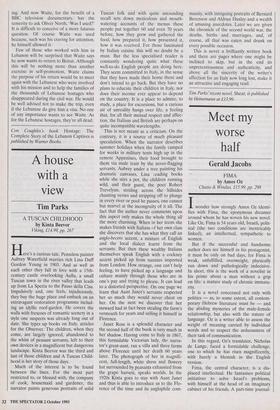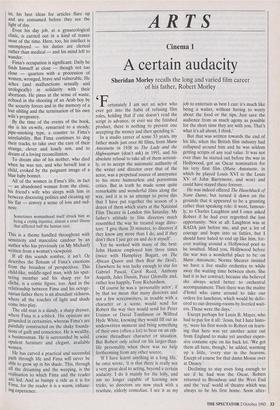Meet my worse half
Gerald Jacobs
FIMA by Amos Oz Chatto & Windus, £15.99, pp. 298 Iwonder how strongly Amos Oz identi- fies with Fima, the eponymous dreamer around whom he has woven his new novel. Like Oz, Fima is 54 years old, Israeli, polit- ical (the two conditions are inextricably linked), an intellectual, sympathetic to women.
But if the successful and handsome author does see himself in his protagonist, it must be only on bad days, for Fima is weak, unfulfilled, overweight, physically run down and pathologically indecisive. In short, this is the work of a novelist in his prime about a man without a grip on life: a mature study of chronic immatu- rity.
It is a novel concerned not only with politics — as, to some extent, all contem- porary Hebrew literature must be — and the abiding mysteries of the male-female relationship, but also with the nature of language. Oz is a writer able to assess the weight of meaning carried by individual words and to respect the arduousness of their task of communication.
In this regard, Oz's translator, Nicholas de Lange, faced a formidable challenge, one to which he has risen magnificently, with barely a blemish in the English version.
Fima, the central character, is a dis- placed intellectual. He fantasises political initiatives to solve Israel's problems, with himself at the head of an imaginary cabinet of his friends. A part-time journal- ist, his best ideas for articles flare up and are consumed before they see the light of day. .Even his day job, at a gynaecological Clinic, is carried out in a kind of trance most of the time. Here, too, his intellect is unemployed — his duties are clerical rather than medical — and his mind left to wander.
Fima's occupation is significant. Daily he finds himself at close — though not too close — quarters with a procession of women, wronged, brave and vulnerable. He aches (and malfunctions sexually and urologically) in solidarity with their abortions. He pines at the sense of waste, echoed in the shooting of an Arab boy by the security forces and in the memory of a lust sibling and the termination of his own Wife's pregnancy.
By the time of the events of the book, she is his ex-wife, remarried to a steady, Pipe-smoking type, a counter to Fima's unreliability. But Fima continues to dog their tracks, to take over the care of their strange, clever and lonely son, and to dream of a loving reconciliation.
To dream also of his mother, who died When he was ten, and who herself lost a Child, evoked by the poignant image of a blue baby bonnet. All of the women in Fima's life, in fact — an abandoned woman from the clinic, his friend's wife who sleeps with him in between discussing politics and cleaning up his flat — convey a sense of loss and sad- ness:
Sometimes womanhood itself struck him as being a crying injustice, almost a cruel illness that afflicted half the human race,
This is a theme handled throughout with sensitivity and masculine candour by an author who has previously (in My Michael) written from a woman's viewpoint.
If all this sounds sombre, it isn't. Oz describes the flotsam of Fima's emotions from the broadest of perspectives. This child-like, middle-aged man, with his sput- tering member and his sharp eye for cliche, is a comic figure, too. And in the relationship between Fima and his octoge- narian father there is an abundant richness, where all the touches of light and shade come into play.
The old man is a dandy, a sharp dresser, where Fima is a schlock. His opinions are grounded in certainties, whereas Fima's are painfully constructed on the shaky founda- tions of guilt and conscience. He is wealthy, a businessman. He is surrounded by solid, Opulent furniture and elegant, available women.
He has carved a practical and successful path through life and Fima will never be able to grow up in his shade. This, through all the dreaming and the weeping, is the realisation to which Fima and the reader are led. And as bumpy a ride as it is for Pima, for the reader it is a warm, enhanc- ing experience.



















































 Previous page
Previous page